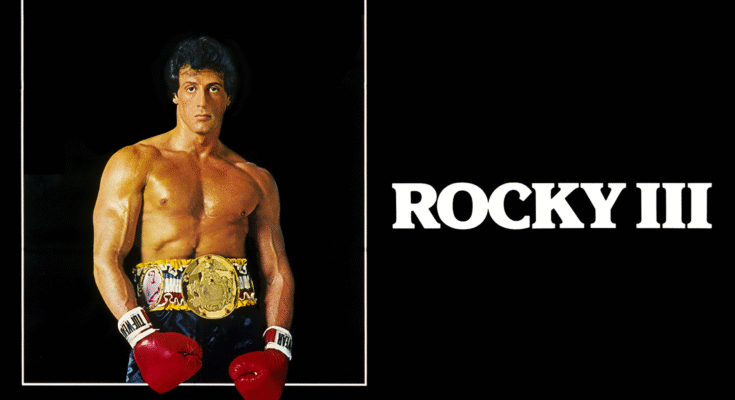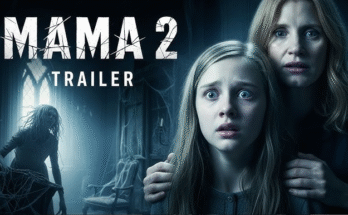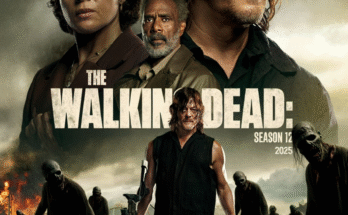Fame is seductive. Glory is fleeting. But the spirit of a fighter — that never dies. Rocky III isn’t just another round in cinema’s greatest underdog saga; it’s a story about what happens after you’ve reached the top — when the roar of the crowd fades and the mirror starts asking harder questions.

The film opens in triumph. Rocky Balboa (Sylvester Stallone) has become everything the world once said he couldn’t — the heavyweight champion, a celebrity, a symbol of triumph. He’s confident, successful, and adored. But behind the smiles and endorsements lies a truth that every champion eventually faces: when you stop fighting for survival, you start losing your edge.
Enter Clubber Lang (Mr. T), a ferocious new challenger with nothing to lose and everything to prove. He’s the embodiment of hunger — raw, unpolished, and dangerous. Where Rocky has softened, Lang is sharpened by rage and desperation. Their first confrontation, both verbal and physical, is volcanic — Stallone’s calm composure colliding with Mr. T’s volcanic fury. “I pity the fool,” he snarls, and he means it.

Rocky’s downfall comes swiftly and painfully. The fight that should’ve been another victory becomes humiliation, and Mickey (Burgess Meredith) — his mentor, father figure, and moral anchor — dies in the aftermath. The loss cuts deeper than any punch could. For the first time since his rise, Rocky isn’t just defeated — he’s broken. The image of him kneeling beside Mickey’s body, whispering apologies between sobs, remains one of Stallone’s most powerful moments as an actor.
It’s here that Rocky III reveals its true heart — not in the fight scenes, but in the friendship that follows. Apollo Creed (Carl Weathers), once his fiercest rival, steps in not as competitor but as teacher. Their training montage on the beaches of Los Angeles — sweat, laughter, rhythm, and rivalry — becomes an anthem to second chances. It’s not just about fighting Lang; it’s about rediscovering why he fights at all.
The chemistry between Stallone and Weathers is magnetic — playful, intense, brotherly. Their shared respect and competitive energy drive the film’s emotional core. Apollo doesn’t just train Rocky physically; he reminds him of his roots, his hunger, his heart. The moment they sprint side by side through the surf — one finally catching up to the other — is the movie’s emotional knockout.

Stallone, directing for the second time in the series, brings a leaner, faster energy to the film. The boxing matches are tighter, more brutal, shot with rhythm and clarity. Bill Conti’s iconic score returns, but it’s Survivor’s “Eye of the Tiger” that defines the movie’s pulse — a song born from the film and destined to echo through generations. Its pounding beat isn’t just soundtrack — it’s heartbeat, the rhythm of resilience.
Mr. T’s Clubber Lang, meanwhile, is more than a villain — he’s a mirror. He’s who Rocky once was: hungry, angry, alive. His presence forces Rocky to see how comfort dulls courage. In defeating Lang, Rocky isn’t just reclaiming his title — he’s reclaiming his soul.
The final fight is cinematic thunder — sweat, fury, redemption. Each round feels like a spiritual test, each blow a reminder that pain isn’t punishment but proof of life. When Rocky finally stands over Lang, victorious but humbled, his triumph feels earned not through strength, but through wisdom.
And then comes the film’s true ending — not in the ring, but in the gym. Apollo asks for the one thing he’s owed: a rematch, just between friends. The freeze-frame of their simultaneous punch — gloves connecting mid-air, smiles breaking across both faces — is one of cinema’s great closing shots. Two warriors, equals, eternal.
💬 Film Verdict:
⭐ 9.4/10 — “Rocky III” is the soul of the series — a story of loss, pride, and rebirth. Stallone, Weathers, and Mr. T create a film that hits harder than any punch, proving that a true champion isn’t made by victory, but by what he survives to fight again. 🥊🔥




